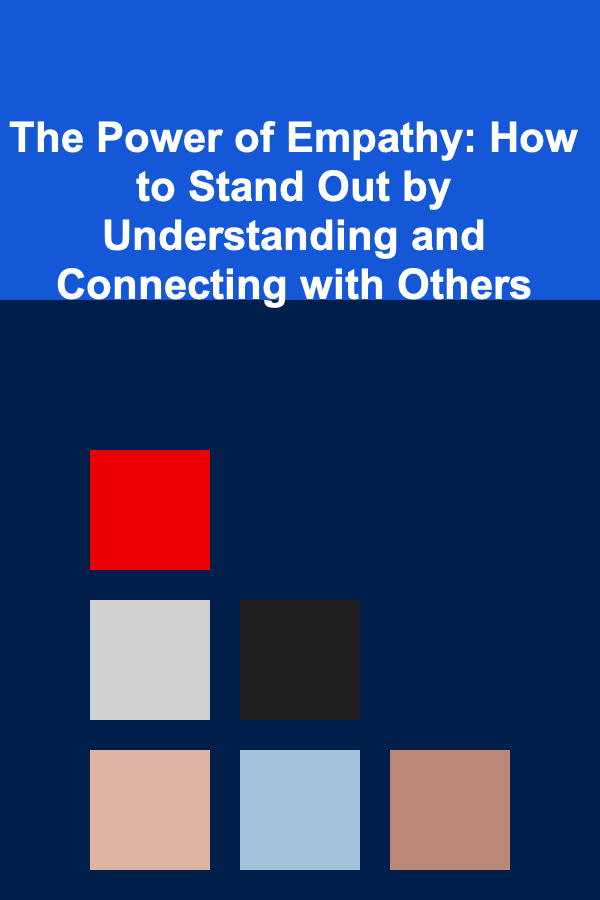
The Power of Empathy: How to Stand Out by Understanding and Connecting with Others
ebook include PDF & Audio bundle (Micro Guide)
$12.99$8.99
Limited Time Offer! Order within the next:

In a world that thrives on connections, standing out often requires more than just technical skills or surface-level charm. The true differentiator in both professional and personal relationships is the ability to understand and connect with others deeply. This is where empathy comes into play. Empathy is the ability to not only understand the emotions and experiences of others but also to share and respond to those emotions in a way that makes them feel heard, valued, and understood.
Empathy isn't just a "nice-to-have" trait; it's a powerful skill that can transform your relationships, enhance your influence, and help you become a standout individual in any area of life. By embracing empathy, you gain the ability to forge genuine, lasting connections and create an environment where people feel supported, respected, and truly seen.
In this article, we'll explore the power of empathy, how to develop it, and how using empathy can help you stand out by fostering deeper, more meaningful relationships.
Understanding Empathy: What It Really Means
Empathy is often confused with sympathy, but they are quite different. Sympathy is feeling pity or sorrow for someone's misfortune, whereas empathy is about putting yourself in someone else's shoes---understanding their feelings, thoughts, and perspectives without judgment. It's about feeling with someone, rather than just feeling sorry for them.
Empathy involves three main components:
- Cognitive Empathy: This is the ability to understand what someone is thinking. It's about recognizing their emotions and understanding their perspective.
- Emotional Empathy: This is the ability to share in the feelings of another person. When you feel emotional empathy, you experience the emotions that the other person is feeling.
- Compassionate Empathy: This takes empathy one step further by motivating you to take action to alleviate the other person's distress. It's about not just understanding someone's pain but also wanting to help.
Empathy is a dynamic and multifaceted skill, and when practiced effectively, it can significantly improve both your personal and professional life.
The Importance of Empathy in Building Relationships
In any relationship---whether it's with a colleague, a friend, a family member, or a client---empathy fosters deeper trust and connection. Here's why it matters:
Building Trust
When people feel understood, they are more likely to trust you. Empathy demonstrates that you're not just hearing them, but you're actually listening and genuinely caring about their feelings and experiences. Trust is the foundation of all strong relationships, and empathy is one of the fastest ways to build it.
Improving Communication
Empathy helps you become a better communicator. When you're able to understand what someone is experiencing emotionally, you can adjust your communication style to meet their needs. This can prevent misunderstandings, reduce conflicts, and make conversations more meaningful and productive.
Strengthening Emotional Bonds
Empathy allows you to forge emotional connections with others. By tuning into their emotions and responding appropriately, you strengthen the emotional bond between you. This deeper connection often leads to stronger, more enduring relationships.
Conflict Resolution
In situations where there's tension or conflict, empathy plays a crucial role. When both parties feel understood, they are more likely to reach a resolution that works for everyone. By demonstrating empathy, you can help de-escalate potential conflicts and foster a collaborative, solution-focused environment.
How Empathy Helps You Stand Out
Empathy isn't just an interpersonal tool---it's also a strategic advantage that can make you stand out in various contexts:
In the Workplace
In a professional setting, empathy can be a key differentiator in leadership. Empathetic leaders are more likely to inspire loyalty, encourage innovation, and foster a supportive work culture. Team members feel valued and understood, leading to higher productivity and engagement.
Empathy can also set you apart as a collaborator and communicator. By listening actively and responding with compassion, you create an environment where people are more comfortable sharing ideas, feedback, and concerns. This can make you a go-to person for problem-solving, brainstorming, and driving projects forward.
In Networking and Professional Relationships
When you engage with others in a way that makes them feel understood and valued, you stand out as someone who isn't just interested in what they can offer but is also genuinely interested in them as a person. This can open doors to new opportunities, partnerships, and collaborations, as people are more likely to remember and refer you to others when they feel personally connected to you.
In Customer Service
In customer-facing roles, empathy is a powerful tool for standing out. When you understand and validate a customer's emotions, you can resolve issues more effectively and leave a lasting positive impression. Empathy builds customer loyalty, as people appreciate when they are treated with respect and consideration, especially when they are frustrated or upset.
In Social Situations
Empathy helps you connect with others on a human level, which can be incredibly valuable in social settings. People are naturally drawn to individuals who can relate to their experiences and emotions. By being empathetic, you can cultivate deeper friendships, strengthen social bonds, and build a positive reputation as someone who is kind, attentive, and considerate.
How to Cultivate Empathy
While some people are naturally more empathetic, empathy is a skill that can be developed and strengthened over time. Here are practical steps you can take to cultivate more empathy in your life:
1. Actively Listen
Listening is the cornerstone of empathy. To truly understand someone, you must give them your full attention. Put away distractions like your phone or computer, and focus on what the other person is saying. Pay attention not just to their words, but also to their body language, tone of voice, and facial expressions. This helps you understand the full scope of their emotions and experiences.
2. Ask Open-Ended Questions
Engage with others in a way that encourages them to open up. Ask open-ended questions that invite people to share their thoughts and feelings. Instead of asking yes/no questions, try asking questions like, "How did that make you feel?" or "What was going through your mind when that happened?" This will help you gain a deeper understanding of their perspective.
3. Put Yourself in Others' Shoes
Try to imagine what it would be like to be in the other person's situation. Consider their background, circumstances, and feelings. This mental exercise helps you connect on a deeper level and provides insight into why they might be feeling or acting the way they are.
4. Be Non-Judgmental
Empathy requires you to suspend judgment and simply listen to the other person's experience without jumping to conclusions or offering unsolicited advice. Even if you don't agree with their perspective, try to understand their point of view without criticism or defensiveness.
5. Respond with Compassion
Once you understand someone's feelings and perspective, respond in a way that shows you care. This might involve validating their emotions, offering words of encouragement, or offering help if appropriate. Compassionate responses demonstrate that you're not just aware of their feelings, but that you are also motivated to offer support or assistance.
6. Be Present
Empathy is most effective when you are fully present with someone. This means being mindful of the moment and the emotions at play, without being distracted by your own thoughts or external factors. Being present allows you to show that you genuinely care about the person in front of you.
The Benefits of Empathy in Personal Growth
Empathy not only helps you connect with others, but it also leads to personal growth. Here's how developing empathy benefits you personally:
Increased Emotional Intelligence
Empathy is a key component of emotional intelligence (EQ), which is the ability to understand and manage your own emotions as well as the emotions of others. A high EQ helps you navigate complex social dynamics, build stronger relationships, and handle difficult conversations with grace.
Greater Self-Awareness
By practicing empathy, you become more attuned to your own emotions and reactions. This self-awareness helps you understand how your actions affect others and how you can communicate more effectively. It also helps you develop a more balanced and empathetic view of yourself.
Enhanced Problem-Solving Skills
Empathy enhances your ability to see problems from multiple perspectives. When you understand the emotional dynamics at play, you can develop more creative and effective solutions. This makes you a stronger problem-solver and a better collaborator.
Improved Mental Health
Empathy can also benefit your own mental health. When you connect with others on an emotional level, it fosters a sense of belonging and reduces feelings of isolation. Helping others and being compassionate also boosts feelings of satisfaction and fulfillment.
Conclusion
Empathy is one of the most powerful tools you can use to stand out and make meaningful connections with others. By understanding and connecting with the emotions and perspectives of those around you, you create stronger bonds, foster trust, and enhance your personal and professional relationships.
Empathy isn't just a nice skill to have---it's a game-changer. It sets you apart, not only by allowing you to connect with others on a deeper level but also by making you a more compassionate, thoughtful, and effective communicator.
In a world that often prioritizes individual achievement and competition, empathy enables you to stand out in a way that promotes collaboration, mutual respect, and genuine connection. So, start practicing empathy today, and watch how it transforms your relationships and helps you leave a lasting, positive impact on the world around you.
Reading More From Our Other Websites
- [Weaving Tip 101] Choosing the Right Materials: Yarns, Fibers, and Dyes for Tapestry Weaving
- [Organization Tip 101] How to Create a Tidy and Inviting Guest Room
- [Scrapbooking Tip 101] Turning Everyday Moments into Timeless Keepsakes: Creative DIY Projects
- [Organization Tip 101] How to Designate a Space for Seasonal Craft Projects
- [Home Party Planning 101] How to Host a Successful Potluck Party with a Guest-Submitted Menu
- [Sewing Tip 101] Seasonal Switch-Ups: Transform Your Closet with Smart Clothing Modifications
- [Simple Life Tip 101] How to Host a Simple Potluck Dinner Party That Builds Community---Stress‑Free
- [Home Staging 101] How to Stage Your Home to Sell as a Luxury Property
- [Simple Life Tip 101] Best Low‑Impact Holiday Traditions for Eco‑Focused Families
- [Personal Investment 101] How to Turn Your Deep Learning Skills into Long-Term Passive Income

How to Establish a Family Tech-Free Zone
Read More
How to Soundproof Your Bedroom for a Better Night's Sleep
Read More
How to Use Tiered Stands for Vertical Utensil Storage
Read More
How to Manage Workplace Stress
Read More
How To Find Books That Are Visually Evocative
Read More
10 Tips for Drone Photography Beginners
Read MoreOther Products

How to Establish a Family Tech-Free Zone
Read More
How to Soundproof Your Bedroom for a Better Night's Sleep
Read More
How to Use Tiered Stands for Vertical Utensil Storage
Read More
How to Manage Workplace Stress
Read More
How To Find Books That Are Visually Evocative
Read More